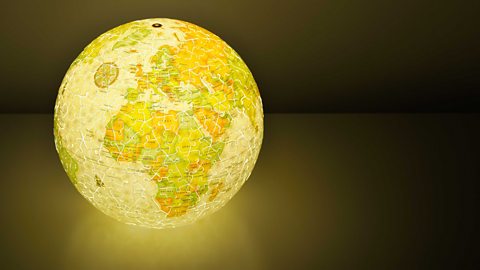Five racist myths debunked
Stereotypes and myths about race are not just expressed by overt racists. For many well-intentioned people, experience and cultural history has steered them towards views that aren’t supported by human genetics. The assumption that East Asian students are inherently better at maths, that black people have natural rhythm, or that Jews are good with money – we all know someone who thinks along these lines.
In Radio 4's How to Argue with a Racist, geneticist Dr Adam Rutherford offers a scientific toolkit to separate fact from myth in understanding how we are different and how we are the same. “Racism is being expressed in public more openly today than at any time I can recall,” says the scientist, “and it’s our duty to contest it with facts.”
Here are five racist myths well and truly debunked.

-
![]()
How to Argue with a Racist
Dr Adam Rutherford offers a scientific toolkit to separate fact from myth in understanding how we are different and how we are the same.
1. The DNA of white and black people is completely different
The primary pigment in human skin is called melanin, and it’s used to protect us from the sun. It absorbs the sun’s ultra violet rays before they can destroy folate, one of the body’s key vitamins.
Many genes are involved in the biochemical pathways that result in melanin production, and natural variation within these genes is the root cause of the spectrum of skin tones that humans have.
So, the biggest genetic difference within the human race is between white people and black people, right? Wrong.
Firstly, all humans share almost all of their DNA – a fact that betrays all of our recent origins from Africa.
Why does racism persist in our daily lives?

What explains the persistence of racial inequality?
Secondly, there is more genetic diversity on the continent of Africa than in the rest of the world put together.
There is more genetic diversity on the continent of Africa than in the rest of the world put together.
Two people from different tribes in Southern Africa will be more genetically different from each other than a Britain, a Sri Lankan and a MΔori.
We categorise people as white, black or brown, for example, but these visual variations don’t accurately reflect the genetic differences – or rather similarities – between us.
2. There is such a thing as βracial purityβ
We think of certain areas, lands or people being isolated, either physically or culturally, and these boundaries as being insurmountable. But this is neither what history nor genetics tells us. In fact, no nation is static.
Some people experience a lot of angst about migrants and refugees coming to the British Isles. But Britain has been steadily invaded throughout its history and has become home to migrants since it became an island around 7,500 years ago!
“People have moved around the world throughout history, and had sex whenever and wherever they could,” says Adam. Sometimes these are big moves in short times. More often people are largely static over a few generations and that can feel like a geographical and cultural anchor.
“Nevertheless, every Nazi has Jewish ancestors. Every white supremacist has Middle Eastern ancestors. Every racist has African, Indian, East Asian ancestors, as well as everyone else.”
“Racial purity is pure fantasy,” says the geneticist. “For humans, there are no pure bloods. Only mongrels enriched by the blood of multitudes.”
3. England is for the English
Some people experience a lot of angst about migrants and refugees coming to the British Isles. Those on the far right have long expressed anger in the form of epithets like “England for the English” or “go back to where you came from.”
In truth, Britain has been steadily invaded throughout its history and has become home to migrants since it became an island around 7,500 years ago!
Before the French took over in 1066, we were invaded by Vikings, and before them there was continuous movement of people from the continent: Angles, Saxons, Huns, and dozens of other smaller tribes and clans.
Before that the Romans ruled, and many of their conscripts were from all over that intercontinental empire and beyond – including sub-Saharan Africans.

Diversity: the definition
When and why did 'diversity' become predominant?
Around 4,500 years ago, Britain was populated primarily by farmers, whose people had migrated from Europe across what was continuous terrain between the Netherlands and East Anglia. On the basis of DNA evidence, we think they may have been olive skinned, with dark hair and brown eyes. And before them there were hunter gatherers, who had even darker skin.
So, when racists say, Britain is for the British, or talk about “indigenous” people, who do they actually mean?
4. A genealogy test can prove someone is 100% white
Genealogy and ancestry fascinate us – and racists in particular.
Websites like Stormfront are frequented by white nationalist, white supremacist, and antisemitic members who are obsessed with population genetics. They use mainstream genealogy tests, like those offered by Ancestry DNA, to “prove” they are 100% white or non-Jewish.
However, the logic is flawed.
DNA can tell you some interesting things about family history, and it’s very useful for identifying close family like lost siblings or biological parents, but its powers are profoundly limited by fundamental biology.
Over time, descendants start to shed the DNA of their actual ancestors – and the amount that vanishes is cumulatively huge.

Why DNA testing to find out your ancestry is a myth
A lot of companies offer DNA testing and you can now have a kit sent to your home.
You carry DNA from only half of your ancestors from eleven generations back.
You carry DNA from only half of your ancestors from eleven generations back. You are descended from multitudes, from all around the world, from people you think you know and from more you know nothing about.
It is possible that you are genetically unrelated to people from whom you are actually descended as recently as the 18th century.
“You are descended from multitudes, from all around the world, from people you think you know and from more you know nothing about,” says Adam.
“You will have no meaningful genetic link to many of them.”
5. Black people are better at running than white people
The last white man to compete in a 100m final at the Olympics was in 1980. Black athletes have dominated the modern era of sprinting, and this has fuelled a commonly held belief that people of African descent have an advantage at the sport because of their genetic ancestry.
In actual fact, the genetics of sporting success are wickedly complex.

There are myriad factors in the physiology of physicality including the size of your heart, the efficiency with which you absorb oxygen, and muscular recovery, says Adam. And these are relatively well understood phenomena, that do have a genetic basis, but there are other physical traits like flexibility and co-ordination which are less well understood. On top of that, there’s the psychological dimension: determination, concentration, and risk-taking for example.
We do know that people who are good at explosive sports tend to have a higher proportion of “fast-twitch” muscle cells, that process energy more quickly. The genetics that underly this involve a gene called ACTN3.
Studies have shown that elite athletes in power and strength sports are more likely to have copies of the R type of ACTN3 and that it also occurs in a higher frequency of African Americans compared to white Americans – 96% compared to 80%.
That does put a slight, population-wide advantage for African Americans for explosive energy sports – but it doesn’t come anywhere near the observed discrepancy between African American sprinters and white competitors. If it just came down to that gene, you might expect to see six black elite sprinters for every five white runners.
This is a simplistic analysis, says Adam, but it exemplifies how the genetics doesn’t align with racial stereotypes in sports. “Maybe there are probabilistic predictions one could make about ethnicity and sporting success based on genetics,” says the scientist, “but they would be weak at best.”
"I'm done with race. I don't identify with the term black"

Poet Lawrence Hoo on his attitude towards race and identity, and why he is now done with race.
More from Radio 4
-
![]()
How to Argue with a Racist
Dr Adam Rutherford offers a scientific toolkit to separate fact from myth in understanding how we are different and how we are the same.
-
![]()
What you can do to spot and stop unconscious bias
How is bias formed? And how can we go about changing our unconscious associations?
-
![]()
How to talk to your children about race and racism
How to talk to your children about race and racism.
-
![]()
17 Multicultural London English words and what they mean
Blud, peng, mandem and more.




